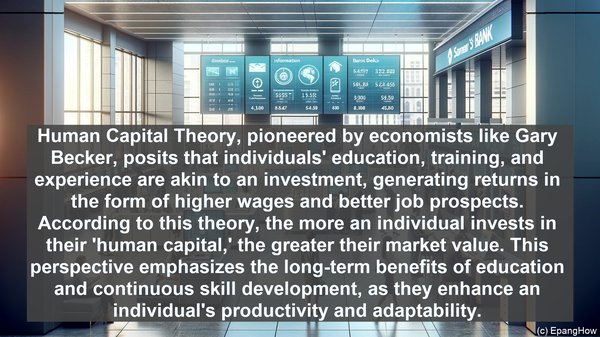Introduction: The Labor Market’s Complex Dynamics
Hello everyone! The labor market is a dynamic ecosystem, constantly evolving with changing demands and supply. Within this intricate system, two theories, Human Capital Theory and Signal Theory, offer contrasting explanations for how individuals’ attributes impact their employability and wages. Today, we’ll explore the key distinctions between these theories and their implications in the real world.
Human Capital Theory: The Value of Investment in Skills
Human Capital Theory, pioneered by economists like Gary Becker, posits that individuals’ education, training, and experience are akin to an investment, generating returns in the form of higher wages and better job prospects. According to this theory, the more an individual invests in their ‘human capital,’ the greater their market value. This perspective emphasizes the long-term benefits of education and continuous skill development, as they enhance an individual’s productivity and adaptability.

Signal Theory: Education as a Credible Indicator
In contrast, Signal Theory, popularized by Nobel laureate Michael Spence, takes a different stance. It suggests that education, rather than directly enhancing productivity, serves as a signal to employers. Completing a degree or acquiring specialized knowledge acts as a ‘signal’ to potential employers, indicating the individual’s ability to learn, follow instructions, and conform to societal norms. In this view, education acts as a screening mechanism, helping employers identify potentially productive candidates.
The Role of Information Asymmetry
To understand the appeal of Signal Theory, we need to consider the concept of ‘information asymmetry.’ In many cases, employers lack complete information about a candidate’s abilities. By relying on educational credentials as signals, employers can make more informed hiring decisions, reducing the risk of hiring someone who may not possess the desired skills. This is particularly relevant in industries where on-the-job training is costly or time-consuming.
Critiques and Limitations
While both theories have their merits, they also face valid criticisms. Human Capital Theory, for instance, has been accused of overlooking the role of social connections and networks in job acquisition. Additionally, Signal Theory’s reliance on educational credentials as signals may disadvantage individuals from disadvantaged backgrounds who may not have had the same access to education. These limitations highlight the need for a nuanced understanding of labor market dynamics, considering multiple factors beyond just education and experience.

